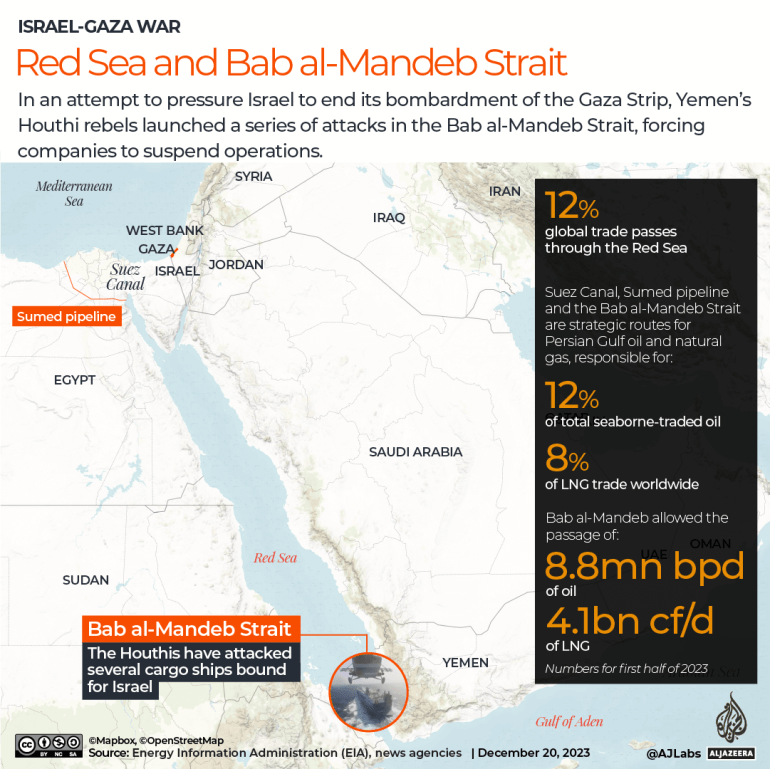explainer
Shipping company Maersk stops its operations after the maritime escalation between the Houthis and American forces.
The US military said it killed 10 Houthi fighters and sank three ships belonging to the Yemeni armed group after a clash in the Red Sea.
The escalation, which was contained in a US statement on Sunday, comes weeks after Houthi attacks on ships it described as linked to Israel that were passing through the Bab al-Mandab Strait into the Red Sea.
The Houthi spokesman said that this comes in an attempt to pressure Israel to stop its devastating war and siege on the Gaza Strip, which has claimed the lives of more than 21,000 Palestinians.
US destroyers have teamed up with a few other countries to try to stop Houthi attacks in the Red Sea under Operation Prosperity Sentinel — although several partners have distanced themselves from the initiative.
The clash in the Red Sea on Monday was the first major direct military clash between the US military and Houthi fighters. Here's what we know about how it all looks:
What happened on Sunday?
On Sunday at 6:30 a.m. Yemen time (03:30 GMT), US Central Command (CENTCOM) issued a second distress call in one day, reporting that it had been attacked by four “Houthi small boats,” US Central Command posted ( CENTCOM) on the X website.
In response to the distress call, the USS Gravely shot down two anti-ship missiles fired at the Maersk and then helicopters from the Gravely and USS Eisenhower were sent toward the Maersk Hangzhou, US Central Command said.
Why do the Houthis attack ships in the Red Sea?
The Houthis began launching drones and missiles towards southern parts of Israel in October, shortly after the outbreak of war on October 7.
However, the drones were intercepted or failed, and the Iran-backed group began attacking ships in the Red Sea that they said were linked to Israel.
Their attacks disabled many ships on their way to Israel.
On December 19, US Defense Secretary Lloyd Austin announced a multinational naval protection force, but the Houthis said they would not back down unless Israel stopped its war on Gaza.
Although several countries have agreed to join the US naval force, only the UK has directly contributed warships, leaving Washington effectively “acting alone” against the Houthis, Al Jazeera’s correspondent reports from Djibouti.
Sardar added that the United States “has not been able to deter the Houthis” so far, as the group frequently launches attacks.
He added that the recent clash represents a dangerous escalation because the United States killed Houthi fighters, and not only sank Houthi boats. Such confrontations raise fears of regional escalation.
Why did the United States sink Houthi boats?
US Central Command says its helicopters warned Houthi fighters to stay away when they began attacking the cargo ship with small arms fire and tried to board the ship.
At that point, US Central Command said, the helicopters came under fire and returned fire, killing 10 crew members on three Houthi boats, which also sank.
The US Central Command added that the fourth boat escaped and the American personnel and equipment were not harmed.
A White House official said: “We will act in self-defense in the future.”
A Houthi spokesman confirmed that 10 of their fighters were “dead and missing” after their boats were attacked.
Iranian-backed Houthi small boats attack a merchant ship and US Navy helicopters in the southern Red Sea
On December 31, at 6:30 a.m. (Sanaa time), the container ship Maersk Hangzhou issued a second distress call in less than 24 hours stating that it had been attacked by four Iranian-backed aircraft. pic.twitter.com/pj8NAzjbVF
– US Central Command (@CENTCOM) December 31, 2023
How did Maersk and other shipping companies react?
Maersk announced on Sunday that it would temporarily stop all cruises through the Red Sea for 48 hours.
Maersk, in cooperation with the German shipping company Hapag-Lloyd, operates nearly a quarter of the global shipping fleet.
Other shipping companies have also responded to the escalating maritime conflict. Shipping company Evergreen has temporarily stopped accepting Israeli goods.
Companies including CH Robinson, Evergreen, HMM, Ocean Network Express, Wallenius Wilhelmsen and Yang Ming Marine Transport plan to avoid the Red Sea and increase the number of ships rerouting around Africa's Cape of Good Hope instead of the Suez Canal. This new route is longer and more expensive.
While these attacks have had a “fairly limited” impact on the oil market so far, experts expect prices could rise if the situation persists.

“Infuriatingly humble analyst. Bacon maven. Proud food specialist. Certified reader. Avid writer. Zombie advocate. Incurable problem solver.”

